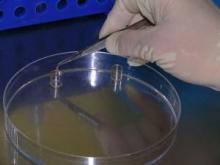 hile Dr. Post presses on with what the New York Times science blog calls “The $325,00 Burger,” the rest of the world must grapple with whether or not cloned or “cultured” hamburger food is really beef.
hile Dr. Post presses on with what the New York Times science blog calls “The $325,00 Burger,” the rest of the world must grapple with whether or not cloned or “cultured” hamburger food is really beef.Dr. Post created his hamburger from “tiny bits of beef muscle tissue” grown in a laboratory. It takes “tens of billions” of cells to create a clone burger. The cell comes from slaughterhouse cow necks. Dr. Post develops cultured meat through stem cells. Post used “about 20,000 thin strips of cultured muscle tissue” to make his burger.
The cultured beef (beef created in vitro from a cell culture) may be test tasted at a hamburger cook off event in London in a few weeks. The cultured burger cost $325,000 to create. The cloned burger is made from strips and strips of cells that re-fabricate. But "billions" of cells are needed to make a full hamburger patty.
In the quest to eat healthier and create healthier human beings, organic food activists have argued that grass fed cattle are better for mankind than slaughterhouse cows. One pro argument for the mass production of cloned beef may be the relaxation that the earth gets from the reduction of grazed cows raised for slaughter.
But even the most supportive of genetically modified meat believe that the sale and market of cloned beef won’t happen anytime in the near or long term future. Even if the mass production and sale of cloned beef would be far less than the price of slaughtering and selling parts of live cattle.
The beef cloning concept eventually may integrate into the minds and hearts of meat eating consumers, organic food activists, and GMO companies like Monsanto and Dow will weigh the benefits and risks of cloned beef.
Cloned beef is an old idea, but a newer GMO food concept. Thus far, genetically modified foods are mostly vegetables, and cotton, but the quest to market genetically modified salmon is still in the works. Dr. Post believes cloned meet “should be safe or safer than conventional meat.” He also said it “may be made to be healthier.”
Other cloned beef ideas include the leather cloning by researchers at the University of Missouri (USA). The idea is far less controversial than cloned meat. And perhaps a lot more appealing to consumers looking for shopping bargains, especially in the winter.
The FDA, in 2007, declared cloned cows, its meat and milk were safe for human consumption.





